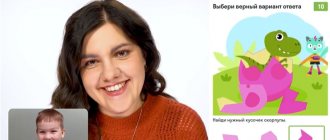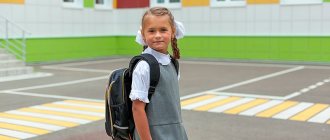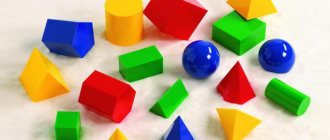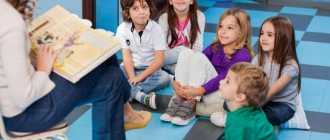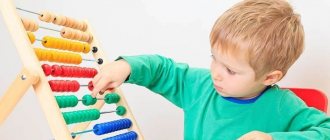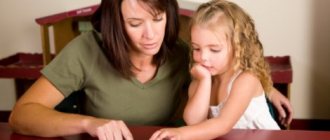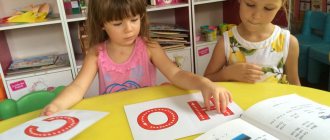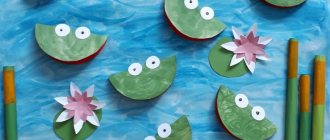The opinion that school will teach a child everything that a literate person should know and be able to do is no longer relevant for a long time.
If earlier parents believed that preparing for school deprives the child of childhood, now the majority tries to send the preschooler to preparation centers or study with him independently.
The question of how to prepare a child for school at home worries many parents.
At what age should preparatory classes begin?
By about 3 years of age, a child can already consciously perceive the simplest mathematical terms, so it is from this age that preparatory classes can begin. Their first stage is the introduction of the concepts “few-many”, “one-several”. After the preschooler has formed a quantitative understanding, he can begin to study numbers.
It’s worth starting with the first two ordinal numbers – one and two. It will be easier to remember them if parents give clear examples - they explain to the child that he has one mouth or nose, but there are two arms, legs, ears, and eyes. This will not only make it easier for the baby to remember the numbers presented, but also easier to learn how to compare them with the number of objects. Later, using the same principle, it is worth studying all other numbers within ten.
Despite the fact that learning numbers and ordinal counting does not seem like a difficult task, even such basic mathematical knowledge must be instilled correctly. Let's look at the most basic recommendations that you should follow.
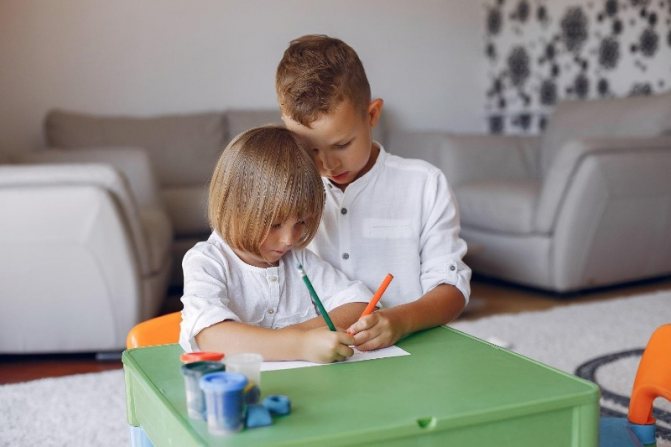
Tasks and games in various subjects
When preparing a child for school, parents should remember several important points:
- Classes should be conducted exclusively in a playful way. Forcing a child to study, yell at him, much less punish or beat him is unacceptable. The task of parents is to interest the child, only then will he be successful in life and win respect among friends.
- The duration of the lesson should not exceed 15 minutes; there must be a break of 20 minutes between lessons.
- Subjects should be alternated - reading with drawing, mathematics with physical education, and so on. Prolonged mental stress has a bad effect on the condition of a growing organism.
- The complexity of the material should be increased gradually; there is no need to rush with new tasks.
- It is recommended to use colorful manuals; reading texts should be interesting.
- Help your child, explain what is not clear, read good fairy tales.
Math lessons
It is advisable to teach your child to count using familiar objects – candy, toys. A little later, you can switch to counting sticks or special cards.
It is very useful to study numbers in pairs, for example, 5 apples and 1 apple, together there will be 6 apples. One such pair needs to be studied for a whole lesson, and at the beginning of the next lesson, you need to repeat the material covered, and then move on to the next pair of numbers.
geometric shapes using cookies as an example - round, square, and triangular cookies can easily be found in stores.
When the child remembers the shapes and names of the main figures, you can move on to drawing them using a ruler.
Reference! Alternation will bring more benefit - today counting, tomorrow - geometry, the day after tomorrow - solving simple examples.
Math games:
- Draw 2 houses of 3 floors, shade the windows in some of the windows of one house, and tell the child that people live in these apartments. The task is to move the same number of people into another house.
- Download number pictures in which you need to connect the numbers in the correct order with lines to make a picture.
- Draw geometric shapes and ask the child to come up with what they can be turned into. For example, a circle - a sun, several triangles - a herringbone, and so on.
Letter
Helpful Tips:
- First you need to train the child’s hand - without this, children will not be able to practice writing for a long time,
- Develop fine motor skills - let the child sort cereals (beans, pasta), do modeling,
- Cutting out various shapes with scissors prepares your hand well for writing.
First you need to teach your child to write block letters , and only when the entire alphabet has been completed can you move on to capital letters.
It is necessary to explain to the child that you need to write carefully and you cannot go beyond the stripes or squares. Of course, the handle should be comfortable, and the child should hold it correctly.
Writing assignments:
- Draw a labyrinth and let the child use a pen to draw a path out of it so that, say, the little bunny finds its mother.
- Draw a simple picture, for example, a bouquet of flowers, and let the child complete the vase for it.
These exercises will help your child learn to hold a pen more confidently.
Reading
The sooner a child learns to read, the easier it will be for him to master all other subjects.
Letters need to be learned alphabetically. They can be drawn, sculpted from plasticine, and parents must come up with an association for each letter. For example, the letter O looks like glasses, J - like a beetle, and D - like a house. If possible, you can show the letters using your fingers or torso.
After the child has learned a few letters, read a short text to him and ask him to look for letters he knows in it.
Be sure to ask what the text you read was about, ask to retell it, ask a few questions about the text.
Tasks:
- Look for a familiar word in a short text. Moreover, this needs to be done in 1 minute.
- Ask your child to read first loudly, then quietly, then silently. At the same time, you need to make sure that the pace of reading does not change. Ask your child to read without opening his teeth. After reading, the child must retell the text.
- In 30 seconds, invite the child to write as many vowels as possible, first, then consonants.
- Write the syllables on the cards and the child will make words from them.
- Play “changeling” - show your child how “cat” can turn into “current”, and “call” into “cart”.
- Write down as many words as familiar to the child and skip them one letter at a time. The child will insert them.
- Teach your child to read at speed. To visualize the improvement in speed, you can use an hourglass.
Creation
Teach your child to use markers, paints and a brush. Teach your child to shade a limited area without going beyond the boundaries. Coloring books with large and then small details will help with this.
While drawing or modeling, you can study other objects, for example, let the child make letters, or while drawing, find geometric shapes - a house is a square, its roof is a triangle, and a ball is a circle.
What to pay attention to - tips for parents
Children of preschool and primary school age do not yet have a high level of perseverance and attentiveness, and therefore long and boring classes are not suitable for them. In addition, if the child is not interested in studying, then this affects both the quality of learning the material and the desire to study in the future. Therefore, in order not to overtire the child and reduce his motivation, it is better to use a game approach to learning. It will allow the preschooler to be involved in the lesson process and make the lessons fun.
In addition to the learning format, you need to monitor how the child compares his knowledge with the general picture of the world. If he studies numbers, then you need to ask him where he can see them in everyday life (on a calendar or watch dial, on TV, in a book, and so on). If a preschooler is learning the concepts of “right-left”, “higher-lower”, then you need to ask him simple questions about spatial orientation: “is the table to the right or left of you?”, “Who is taller - me or you?”
Similar examples of tasks are suitable for children under 5 years old and will help develop their skills. For future first-graders it is worth choosing other, more complex exercises.
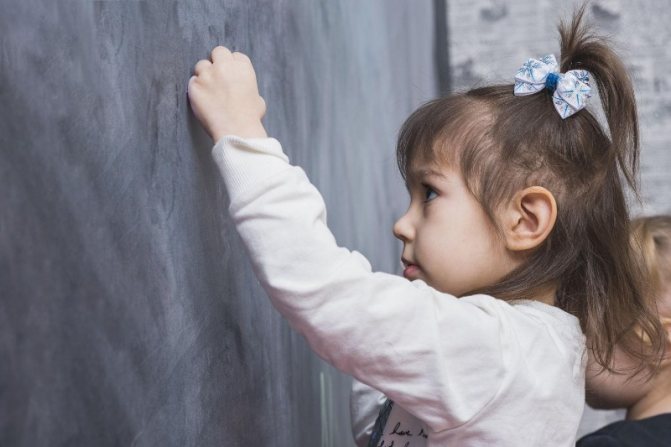
Math assignments for school preparation
It is advisable that a first-grader already has developed certain mathematical knowledge, and it is their development that time should be devoted to before school:
- ordinal counting: from 1 to 20 and back.
- knowledge of what numbers look like, the ability to identify them by appearance.
- arithmetic operations: addition and subtraction within 10.
- ability to identify simple geometric shapes: circle, oval, square, rectangle, triangle.
- ability to navigate in space: knowledge of the concepts “right-left”, “more-less”, “higher-lower”.
To fully prepare for school in mathematics, there will be enough tasks aimed at developing all the skills presented above. However, when teaching children 6-7 years old, it is especially important to follow some rules, and first of all, this concerns the sequence of presentation of the material.
Wanting to teach their son or daughter a wide range of skills, parents often jump from one topic to another. Because of this, the kids themselves get confused, and preparation does not bring the desired result. Another common problem is the desire of adults to teach a preschooler the basics of mathematics as quickly as possible. In this case, he does not have time to fully consolidate the material and understand it properly.
To make preparation for school effective, you need to take into account the age characteristics of preschoolers. This is not always possible without the help of professional teachers, so it is better to prepare for 1st grade in preparatory courses, and at home simply repeat what you have already learned.
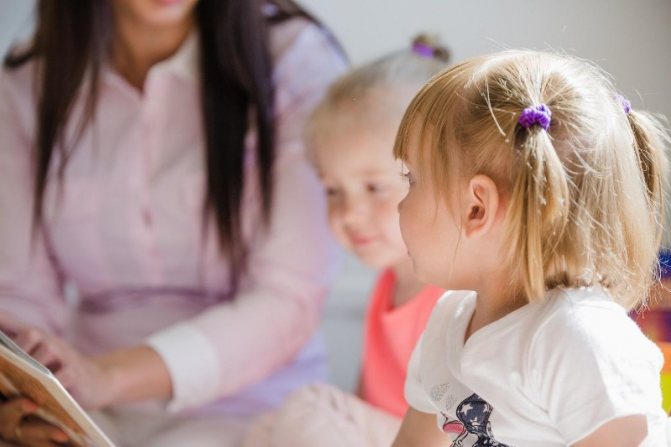
Requirements for preparing a child for school: list
It is necessary to instill in a child an interest in learning something new, reading, writing, and gaining knowledge from an early age. Nowadays it is customary to send children to first grade who already know how to count, draw, write, and know letters and numbers and recognize the names of animals, flowers, and plants.
Teachers in kindergartens and parents at home should teach this to children. Moreover, there is even a list of skills that a child must have before going to school.
What a baby should be able to do:
- Know your full name , the names of your parents, their professions, date of birth and residential address.
- Distinguish and know the names of 12 primary colors : red, pink, orange, yellow, green, light green, blue, indigo, violet, black, white, brown.
- Have an idea about the days of the week : how many there are, what are the weekends, what are the working days, what is the name of each day.
- Know the seasons (seasons) , it is advisable to know the names of the months (at least some).
- Know the names of the main professions: doctor, nurse, teacher, director, driver, policeman, fireman, cleaner, salesman, miner, builder, and so on.
- Distinguish between left and right
- Know the names of animals and their young: cat - kitten, horse - foal, dog - puppy and others.
- Know the names of the main birds : chicken, rooster, crow, magpie, sparrow, tit, bullfinch, seagull.
- Know the names of transport (basic) : car, bus, motorcycle, tram, minibus, taxi.
- Have concepts of orientation : above, below, in the corner, behind, in front.
- Distinguish vegetables from fruits, name them : tomato, cucumber, eggplant, zucchini, corn, pumpkin, pepper, onion, garlic, apple, pear, banana, peach and other basic names.
- Name your body parts and understand their necessity: the eyes look, the legs walk, the hands grab, the nose breathes, the mouth speaks, the head thinks.
"Mathematical" requirements:
- Count to 10 (both from 0 and 10 - i.e. vice versa)
- Compose numbers (two digits)
- Distinguish between the concepts of “more” and “less”
- Become familiar with the concepts of “high” and “low”
- Distinguish and name the main figures
What speech skills should you have:
- Repeat and retell simple stories
- Make up a story by looking at a picture
- Be able to retell and recite simple poems.
- To know or to write fairy tales
- Understand the questions asked and try to answer them.
- Remember several pictures at once
- Be able to finish a sentence (come up with an ending)
- Understand which word or picture is the odd one out in a row
- Solve children's riddles
Another skills:
- Know the names of letters and possibly sounds
- Find a word for a picture
- Be able to trace shapes and letters along the contour
- Hold a pen or pencil
- Understand what is good and what is bad
- Understand what it means to “behave diligently”
- Respect elders
- Have social skills (being in a team)
IMPORTANT: How well, easily and quickly a child will perceive information in preschool age depends only on the intensity of classes, parental attention, mentality, genetic inheritance and desire.
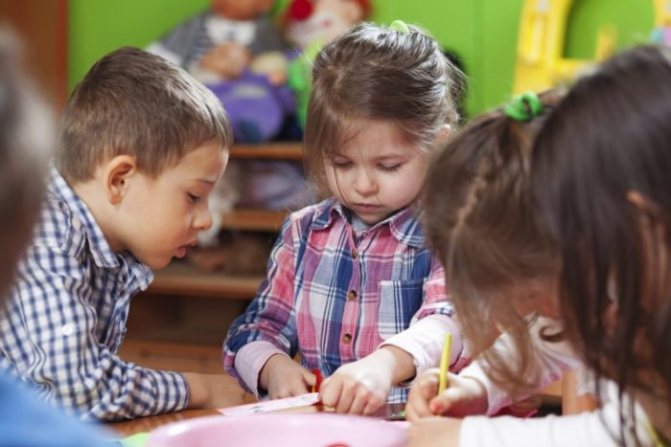
Skills of preschoolers before 1st grade
How to choose preparatory courses?
When choosing courses, parents need to study reviews of the schools or additional education centers where they are conducted. It is important to understand how children are taught, according to what program, with the help of what textbooks and manuals. The speed of adaptation to academic loads and the performance of a first-grader will depend on the level of preschool preparation, which is why it is so important to choose proven classes.
An example of this is the school preparation courses from the AMAkids Academy for the Development of Intelligence. They provide broad subject training: they teach the basics of mathematics, develop reading skills, and instill knowledge of the surrounding world. Classes are conducted in a gaming format using educational games on an educational platform. Thanks to this approach, students do not get tired of classes, as they learn while playing. Sign up for preparatory courses from AMAkids and start preparing for school now!
What will your child learn in online classes?
When we talk about preparing a child for school, we first of all mean his ability to respond, his skills that will help in a new type of activity. Namely, development:
- attentiveness;
- thinking;
- learning ability.
Thanks to regular classes and completing various tasks, the child will have a clear idea of what awaits him and will be able to “pump up” the necessary skills.
Organizational habits
Even while studying at home, a preschool child will learn to prepare his own workplace for a lesson, learn to listen and hear the teacher and follow his instructions, and will understand what he needs for the lesson to be comfortable.
Familiar environment
School is no longer a kindergarten, but a completely new reality for a preschooler. Preparatory online classes will help him not to get confused during the real lesson, because the environment will already be familiar to him. He will have an idea of what a lesson is, that it lasts a certain time and during this specific time he must try not to be distracted by extraneous matters.
Not “I want”, but “I need”
A change in leading activity in childhood is, in fact, a very stressful stage. Help your child - give him the opportunity to realize and accept in advance that he will no longer be able to get up from his chair when he’s tired and go play another game with a friend.
